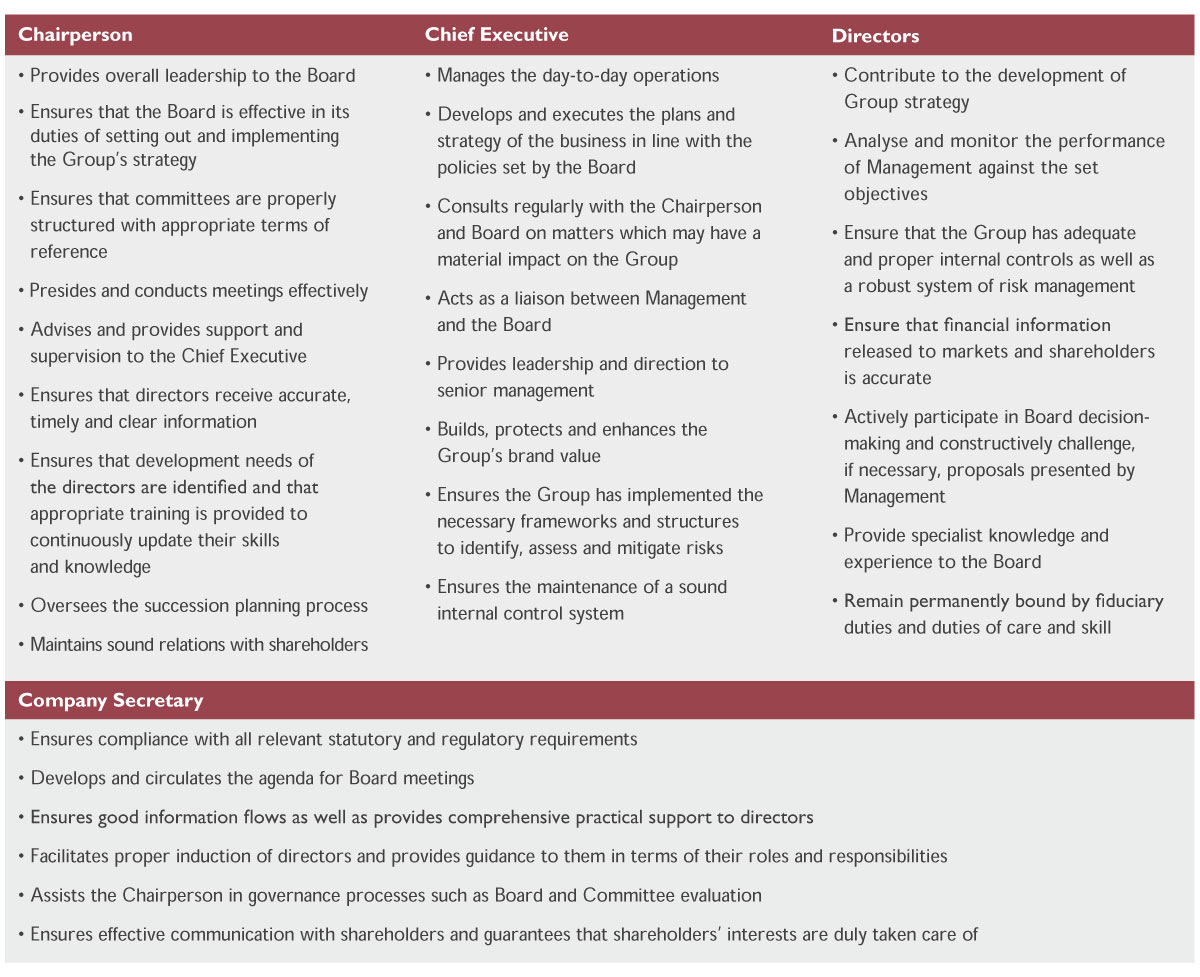
Corporate governance report
Our philosophy
The Board of MCB Group Ltd is committed to applying high standards of corporate governance, which are viewed as being critical in meeting the Group’s objective of creating sustainable value for its stakeholders and society at large. It ensures that good governance norms and practices are adopted throughout the organisation, with the aim to uphold professional and ethical behaviour by employees in their dealing with stakeholders. Indeed, principles of integrity, accountability and transparency are inherent to the Group’s values, culture, processes and operating structures. In view of the fast-changing and increasingly challenging operating environment, the Board continuously monitors and adapts practices to reflect developments in corporate governance principles to ensure smooth business operations and enhance stakeholder engagement. The Group’s sound governance standards and practices are anchored on key pillars as highlighted in the diagram below.
Strong commitment to ethics and values
- Dedicated Board Committee overseeing ethical conduct across the Group
- Application of the Group’s ‘Code of Ethics’, approved and monitored by the Board
- Whistleblowing Policy allowing employees to report matters of concern in strict confidentialit
Strict compliance to rules and regulations
- Adherence by Group entities to the provisions of legislations, rules and regulations in countries where they operate
- Compliance by relevant domestic entities with the National Code of Corporate Governance for Mauritius (2016)
- Compliance with international reporting requirements as applicable
- Adoption of the underlying Basel principles by banking subsidiaries
Robust risk governance and internal control
- Ring-fencing of activities, as gauged by the segregation of banking and non-banking operations
- Board responsible for oversight and monitoring of risk profile against risk appetite through adapted frameworks
- Provision of independent assurance by both internal and external auditors
Continuous multi-stakeholder engagement
- Ongoing dialogue and transparent communication with the investment community
- Help customers achieve their goals and support economic development
- Safeguard of cultural and environmental heritage
- Promotion of community well-being and fostering of staff development and welfare
Governance structure
Governance framework
MCB Group Ltd is led by a committed and unitary Board, which is collectively responsible for the overall leadership and oversight of the organisation. The Group operates within a well-established governance framework, which enables delegation of authority and clearly defined mandates, without removing the Board’s responsibility. Through this framework, the Board sets out the strategic direction and has entrusted the day-to-day running of the organisation to the Management Executives with their performance and effectiveness closely monitored against set objectives and policies. In order to discharge its duties and responsibilities in an effective manner, the Board has established five committees, mandated to provide specific expertise and specialist guidance to it on matters affecting the Group’s activities. The fundamental relationships among the Board, Board Committees and Management Executives as well as their main respective roles are illustrated in the following diagram.
Role of the Board

Role of Board Committees
Role of Management
The roles and responsibilities of the Chairperson, executive and non-executive Directors as well as the Company Secretary are clearly defined in the Board Charter and Position Statements, which have been approved and are regularly reviewed by the Board. The role of the Chairperson is distinct and separate from that of the Chief Executive and there is a clear division of responsibilities with the Chairperson leading the Board and the Chief Executive managing the Group’s business on a day-to-day basis. The Board ensures that the external obligations of the non-executive directors do not hinder the discharge of their duties and responsibilities. In this context, it is worth noting that the external commitments of the Chairperson did not change during the financial year under review.
Key roles and responsibilities
Chairperson
- Provides overall leadership to the Board
- Ensures that the Board is effective in its duties of setting out and implementing the Group’s strategy
- Ensures that committees are properly structured with appropriate terms of reference
- Presides and conducts meetings effectively
- Advises and provides support and supervision to the Chief Executive
- Ensures that directors receive accurate, timely and clear information
- Ensures that development needs of the directors are identified and that appropriate training is provided to continuously update their skills and knowledge
- Oversees the succession planning process
- Maintains sound relations with shareholders
Chief Executive
- Manages the day-to-day operations
- Develops and executes the plans and strategy of the business in line with the policies set by the Board
- Consults regularly with the Chairperson and Board on matters which may have a material impact on the Group
- Acts as a liaison between Management and the Board
- Provides leadership and direction to senior management
- Builds, protects and enhances the Group’s brand value
- Ensures the Group has implemented the necessary frameworks and structures to identify, assess and mitigate risks
- Ensures the maintenance of a sound internal control system
Directors
- Contribute to the development of Group strategy
- Analyse and monitor the performance of Management against the set objectives
- Ensure that the Group has adequate and proper internal controls as well as a robust system of risk management
- Ensure that financial information released to markets and shareholders is accurate
- Actively participate in Board decisionmaking and constructively challenge, if necessary, proposals presented by Management
- Provide specialist knowledge and experience to the Board
- Remain permanently bound by fiduciary duties and duties of care and skill
Constitution of MCB Group Limited
The Board
Mandate
The Board defines the Group’s purpose, strategy and value and determines all matters relating to the directions, policies, practices, management and operations of the Company and all its subsidiaries locally and abroad. The Board thereafter ensures that the Group is being managed in accordance with its directions and delegations.
Key facts
12
4
9
92%
* MCB Group Ltd has been in operation since April 2014
Responsibilities
The methods through which the Board exercises its powers and discharges its responsibilities are set out in the Board Charter of MCB Group Ltd, which provides, inter alia, for the following:
-
the composition of the Board with an appropriate balance of executive, non-executive and independent directors;
-
the Chairperson of the Board who may be an independent non-executive director;
-
the creation of Board Committees;
-
the adherence to the Group’s ‘Code of Ethics’;
-
the approval of strategic objectives, policies and corporate values as well as their communication throughout the organisation;
-
the monitoring of Management in respect of the implementation of Board plans and strategies, and compliance with set policies;
-
the existence of clear lines of responsibility and accountability throughout the organisation and compliance with all relevant laws, regulations and codes of business practice;
-
a formal and transparent directors’ remuneration policy;
-
the review of procedures and practices to ensure soundness and effectiveness of the Group’s internal control systems;
-
the existence of a robust Enterprise Risk Management system, with a view to ensuring that key risks across each Group entity are effectively addressed and that risk discussions are elevated to the strategic level;
-
the setting of principal policies in respect of risk and conduct of business for the Company; and
-
the provision of timely and accurate information to shareholders, relevant authorities and the public.
Approval of the Board is specifically required for, amongst other important matters, modifying the Company’s Constitution, issuing fresh capital or buying back its own shares, declaring dividends, acquiring or divesting sizeable stakes in subsidiaries or associates, making appointments of senior officers, and establishing the remuneration of executive and non-executive directors and chief executives.
Composition and meetings
Composition
As per the Board Charter, the Board shall consist of a minimum of five and a maximum of twelve directors, of which at least two executive and two independent directors. The Chairperson of the Board may be independent. The Board, assisted by the Remuneration, Corporate Governance and Ethics Committee (RCGEC) regularly reviews the Board size, structure and composition, including the independence status of the non-executive directors. Since the last Annual Meeting held in November 2018, Mr Navin Hoolooman and Mr Jean-Pierre Montocchio have retired and there have been two new appointments, namely Mr Michael Lising and Mrs San T. Singaravelloo. In the same vein, Mr Didier Harel, Mr Jean-Louis Mattei and Mrs Karuna Bhoojedhur-Obeegadoo have been re-elected as directors, in line with the Companies Act 2001 and the Group’s Constitution.
As at 30 June 2019, the Board consisted of twelve members including three female directors, with a diverse range of skills, knowledge and experience, with average age of around 60 years. The Board composition for the year under review is shown hereafter.
Meetings
The Board determines the frequency of Board meetings in a way to ensure that it can focus on key issues at the appropriate time. In this respect, the Charter requires that meetings be conducted at least on a quarterly basis. Although the Board maintains a scheduled programme of meetings, there is sufficient flexibility in the agenda to include specific items as and when required. Meetings are convened so that directors are able to attend and participate in person. In case personal attendance by some or all the directors is not possible, meetings are conducted by means of audio and/or video conferences. Members of the Management team and/or external advisors are sometimes invited to attend meetings to discuss topical issues identified by the Board. Directors receive Board papers in a timely manner to facilitate meaningful discussions as well as informed and focused decisions at the meetings. All materials for Board meetings are uploaded onto a secure portal, which can be accessed by directors on tablet devices. The Chairperson presides over the Board meetings to ensure their smooth functioning and promotes open and frank debates. The agenda setting process is described in the diagram hereafter.
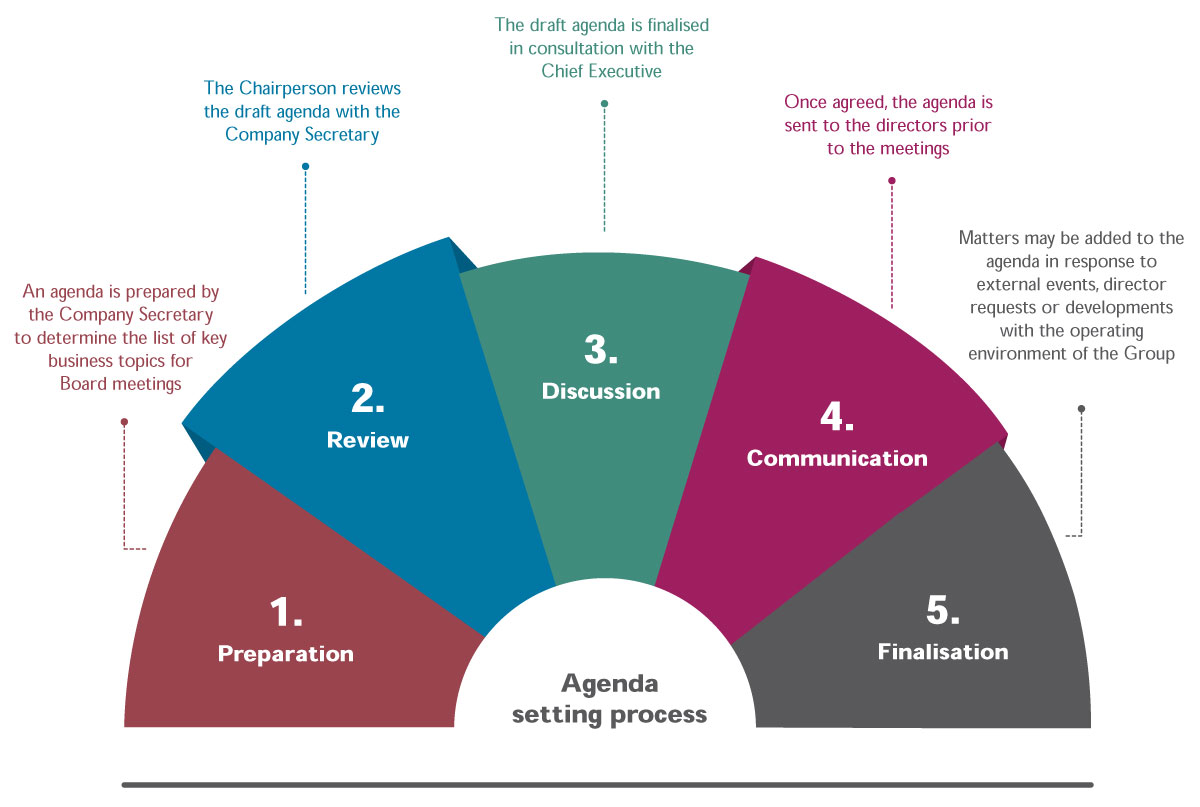
Board attendance
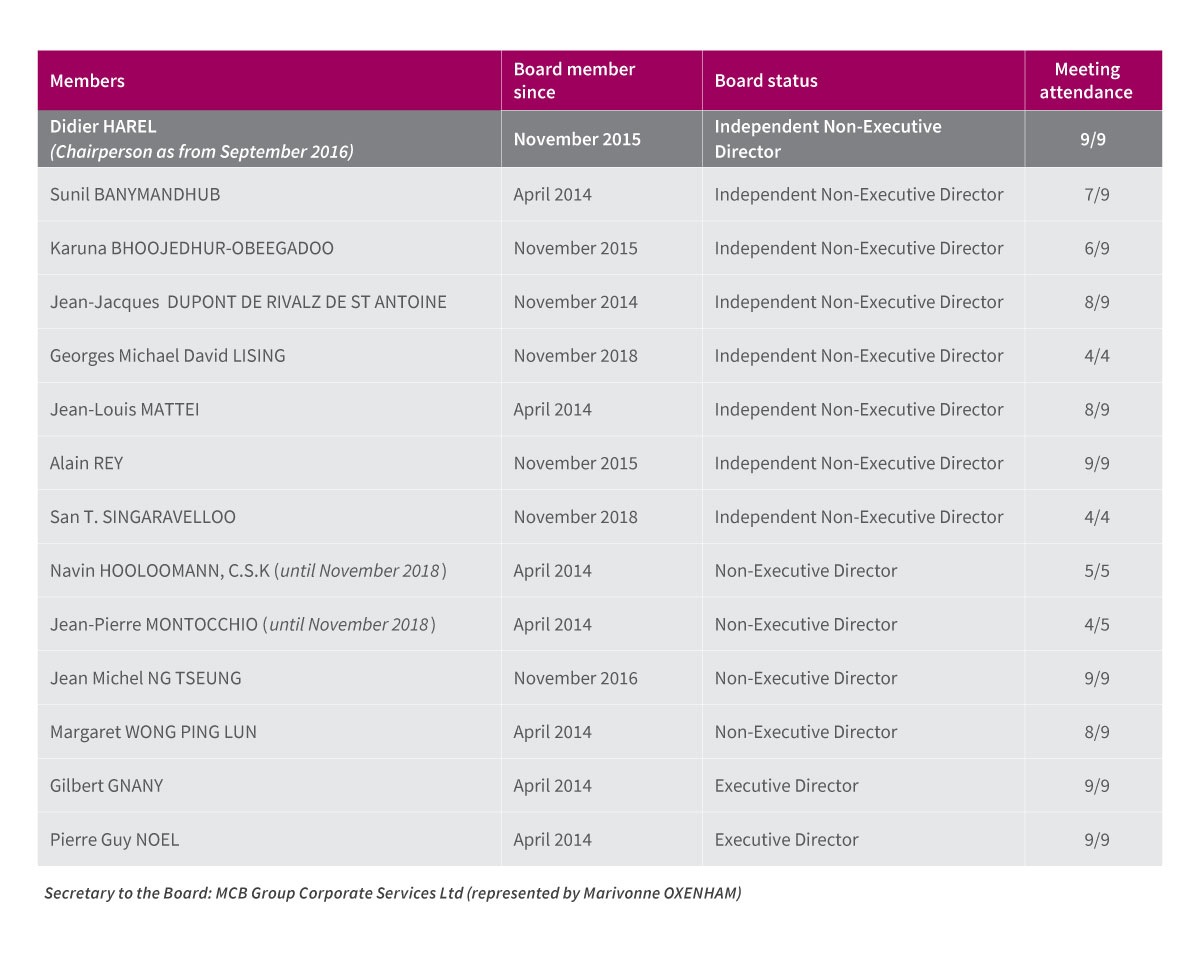
The directors who served on the Board and their attendance at Board meetings during FY 2018/19 is provided in the following table:
Didier HAREL (Chairperson as from September 2016)
-
Board member since: November 2015
-
Board status: Independent Non-Executive Director
-
Meeting attendance: 9/9
Sunil BANYMANDHUB
-
Board member since: April 2014
-
Board status: Independent Non-Executive Director
-
Meeting attendance: 7/9
Karuna BHOOJEDHUR-OBEEGADOO
-
Board member since: November 2015 I
-
Board status: Independent Non-Executive Director
-
Meeting attendance: 6/9
Jean-Jacques DUPONT DE RIVALZ DE ST ANTOINE
-
Board member since: November 2014
-
Board status: Independent Non-Executive Director
-
Meeting attendance: 8/9
Georges Michael David LISING
-
Board member since: November 2018
-
Board status: Independent Non-Executive Director
-
Meeting attendance: 4/4
Jean-Louis MATTEI
-
Board member since: April 2014
-
Board status: Independent Non-Executive Director
-
Meeting attendance: 8/9
Alain REY
-
Board member since: November 2015
-
Board status: Independent Non-Executive Director
-
Meeting attendance: 9/9
San T. SINGARAVELLOO
-
Board member since: November 2018
-
Board status: Independent Non-Executive Director
-
Meeting attendance: 4/4
Navin HOOLOOMANN, C.S.K (until November 2018)
-
Board member since: April 2014
-
Board status: Non-Executive Director
-
Meeting attendance: 5/5
Jean-Pierre MONTOCCHIO (until November 2018)
-
Board member since: April 2014
-
Board status: Non-Executive Director
-
Meeting attendance: 4/5
Jean Michel NG TSEUNG
-
Board member since: November 2016
-
Board status: Non-Executive Director
-
Meeting attendance: 9/9
Margaret WONG PING LUN
-
Board member since: April 2014
-
Board status: Non-Executive Director
-
Meeting attendance: 8/9
Gilbert GNANY
-
Board member since: April 2014
-
Board status: Executive Director
-
Meeting attendance: 9/9
Pierre Guy NOEL
-
Board member since: April 2014
-
Board status: Executive Director
-
Meeting attendance: 9/9
Board focus areas
- Reviewed and approved the strategic orientations and budget plans of all the banking and non-banking subsidiaries of the Group
- Monitored the progress of key ongoing projects namely relating to Digital Transformation and HR Transformation as well as the revamping of the Treasury and MCB Private Banking & Wealth Management functions
- Discussed the launch of the Corporate Sustainability Programme (Success Beyond Numbers) and briefed on related initiatives
- Assessed the development of the growth pillars of MCB Ltd
- Monitored the setting up of Dubai representative office and of the MCB Institute of Finance Ltd
- Reviewed and approved the structure, size and composition of the Board and Board Committees
- Assessed the need to carry out a Board evaluation exercise and approved the appointment of an external consultant
- Discussed recommendations made by an external consultant on the Group’s risk management framework
- Briefed on Anti-Money Laundering and Combating the Financing of Terrorism
- Assessed and monitored the Group’s financial performance against budget
- Reviewed regularly reports from the Audit and Risk Monitoring Committees
- Approved declaration of interim and final dividends
- Approved the minutes of proceedings
- Reviewed reports from Chairpersons of Committees
- Reviewed and approved the Group’s consolidated accounts on a quarterly basis
- Debriefed on the Annual Meeting of Shareholders
- Updated on developments in the operating environment
Directors’ profiles
The Board comprises 12 directors who have a proven track record in various fields. Profiles of directors who held office at the end of the financial year as well as their directorships in other listed companies (where applicable) are given hereafter. Unless otherwise stated in their respective profile, directors reside in Mauritius.
Chairperson

Didier HAREL
Age 67
Independent Non-Executive Director
Date of first appointment: November 2015
Qualifications: ‘BSc in Chemical Engineering and Chemical Technology (UK) and MBA (France)
Skills and experience: Didier has a track record of over forty years in the downstream sector of the oil industry, having worked for the EXXON and TOTAL Groups. He started his career with Esso in Mauritius in 1974 and was appointed as Managing Director of Esso Reunion in 1982. He joined the TOTAL Group in 1988 where he was entrusted several international assignments, initially as Managing Director of TOTAL in Zambia and Zimbabwe and subsequently as Managing Director and Chief Executive Officer of major TOTAL Refining & Marketing subsidiaries in South Africa and in the United Kingdom. He also shouldered an array of senior executive positions in the marketing and logistics arena at TOTAL’s Africa and Middle East Head Office in Paris and within TOTAL France, the home-based marketing and distribution company of the group. He was seconded in 2012 by TOTAL S.A as Chairman and CEO of Société Anonyme de Gestion des Stocks Stratégiques, the national oil compulsory stock obligation entity for France.
Board Committee memberships: Risk Monitoring Committee; Remuneration, Corporate Governance and Ethics Committee (Chairperson); Strategy Committee (Chairperson); Supervisory and Monitoring Committee (Chairperson)
Directorships in other listed companies: Sun Ltd; Terra Mauricia Ltd
Executive Directors

Pierre Guy NOEL
Age 63
Chief Executive
Date of first appointment: April 2014
Qualifications: ‘BSc (Honours) in Economics and Chartered Accountant (UK)
Skills and experience: From 1981 to 1991 , Pierre Guy worked at De Chazal Du Mée & Co. where he became a partner in financial consultancy. He joined MCB in 1992 as Planning and Development Consultant before being appointed General Manager of the Bank in 1996. Following the organisation’s restructuring, he became the Chief Executive of MCB Group Ltd in April 2014. He is a Board member of several companies within the Group namely Banque Française Commerciale Océan Indien, MCB Madagascar, MCB Seychelles, MCB Maldives, MCB Investment Holding Ltd, MCB Capital Markets Ltd, MCB Equity Fund Ltd, MCB Consulting Services Ltd, MCB Factors Ltd, International Card Processing Services Ltd, Credit Guarantee Insurance Co. Ltd, MCB Microfinance Ltd and MCB Institute of Finance amongst others, acting either as Chairperson or Director. He was appointed to the Board of MCB Ltd in 2005 and was a Director thereof until March 2014 when he joined the Board of MCB Group Ltd following the Group’s restructuring exercise.
Board Committee memberships: Risk Monitoring Committee; Remuneration, Corporate Governance and Ethics Committee; Strategy Committee; Supervisory and Monitoring Committee
Directorship in other listed companies: Compagnie Des Villages De Vacances De L’Isle De France Limitée (COVIFRA)

Gilbert GNANY
Age 57
Chief Strategy Officer
Date of first appointment: April 2014
Qualifications: ‘Licence ès Sciences Economiques (Economie Mathématique)’, ‘Maîtrise en Econométrie’ and ‘DESS en Méthodes Scientifiques de Gestion et Calcul Economique Approfondi’ (France)
Skills and experience: Gilbert previously worked as Senior Advisor on the World Bank Group’s Executive Board where he was responsible for issues relating mainly to the International Finance Corporation and to the private and financial sectors. Prior to joining the World Bank, he was the MCB Group Chief Economist and Group Head of Strategy, Research & Development after having been the Economic Advisor to the Minister of Finance in Mauritius. During his career, he has been involved in various high-profile boards/committees. Amongst others, he chaired the Stock Exchange of Mauritius Ltd, the Statistics Advisory Council and the Statistics Board as well as having been a member of the Board of Governors of the Mauritius Offshore Business Activities Authority, a director of the Board of Investment and of the Mauritius Sugar Authority. He was also a member of the IMF Advisory Group for sub-Saharan Africa, a member of the Senate of the University of Mauritius and a director of the Financial Services Institute. He is currently a Board member of several companies within the Group namely MCB Capital Markets Ltd, MCB Seychelles, MCB Maldives, MCB Madagascar, MCB Microfinance Ltd and MCB Consulting Services Ltd amongst others. On the institutional side, he is an external IMF expert in statistics, in particular on data dissemination standards and strategy and is also a member of the Financial Services Consultative Council. Furthermore, he is the Chairperson of the Economic Commission of Business Mauritius which serves, inter alia, as a platform for public-private sector dialogue.
Board Committee memberships: Risk Monitoring Committee; Strategy Committee (also acts as Secretary)
Directorships in other listed companies: Promotion and Development Ltd; Caudan Development Ltd; COVIFRA, Medine Ltd
Directorships in listed funds: MCB India Sovereign Bond ETF; African Domestic Bond Fund
Independent Non-Executive Directors

Sunil BANYMANDHUB
Age 70
Date of first appointment: April 2014
Qualifications: ‘BSc (Honours) in Civil Engineering, Master’s degree in Business Studies and Chartered Accountant (UK)
Skills and experience: Sunil has occupied senior positions in the private sector in Mauritius prior to launching his own transport company in 1990. In 2001, he joined the CIM Group, a company engaged in financial and international services, from which he retired as Chief Executive Officer in 2008. During his career, he has been involved in various private sector organisations. Amongst others, he was President of the Mauritius Employers’ Federation. He was a member of the Presidential Commission on Judicial Reform, headed by Lord Mackay of Clashfern, a former UK Lord Chancellor. He is currently a director of a number of domestic and global business entities, acting either as Chairperson or board member, and is also Adjunct Professor at the University of Mauritius.
Board Committee memberships: Audit Committee (Chairperson until March 2019); Strategy Committee
Directorships in other listed companies: Fincorp Investment Ltd; New Mauritius Hotels; Blue Life Ltd

Karuna BHOOJEDHUR – OBEEGADOO
Age 58
Date of first appointment:November 2015
Qualifications: ‘BSc (Hons) in Actuarial Science and Fellow of the Institute and Faculty of Actuaries (UK)
Skills and experience:Karuna started her career at the M&G Reinsurance Company in London (now Swiss Re) in 1985 prior to joining the State Insurance Company of Mauritius Ltd (SICOM) as Actuary and Manager of the Life, Pensions and Actuarial departments in 1990 when she was also appointed Actuarial Advisor to the National Pensions Fund and member of its Investment Committee. She has been the Chief Executive of the SICOM Group from 1996 to 2017 and is a director of various companies within the group. In the past, she has served as director on the board of several companies, including State Bank of Mauritius Ltd, National Mutual Fund Ltd, First Republic Fund Ltd, Cyber Properties Investment Ltd, Mauritius Housing Company Ltd, National Housing Development Company Ltd, China Index Fund Ltd and China Actis Ltd. She was also a Founding Member of the National Committee on Corporate Governance and of the Board of Investment. She is currently a director of MCB Equity Fund Ltd, a subsidiary of MCB Group Ltd.
Board Committee memberships: Remuneration, Corporate Governance and Ethics Committee

Jean-Jacques DUPONT DE RIVALZ DE ST ANTOINE
Age 68
Non-Resident
Date of first appointment: November 2014
Qualifications: ‘‘Diplôme de l’Institut d’Etudes Politiques de Paris’ (France) and MBA (USA)
Skills and experience:Jean-Jacques started his career in 1977 as Financial Advisor at Deep River Beau Champ prior to joining the World Bank Group in 1980 under the Young Professionals Program. He integrated the International Finance Corporation where he worked on agro-industrial projects in several countries in West Africa. Since 1987, he acted as Principal Operations Officer within the World Bank successively for Europe, Central Asia, Latin America and the African region, whilst being responsible for the Health, Nutrition and Population (HNP) projects undertaken in various countries therein. Moreover, he was appointed as Cluster Leader of the World Bank’s HNP Division for West Africa in 2008 before acting as the Sector Manager for the African region in 2011- 2012 when he was also a member of the HNP Sector Board worldwide.
Board Committee memberships: Risk Monitoring Committee (until January 2019); Strategy Committee; Remuneration, Corporate Governance and Ethics Committee

Georges Michael David LISING
Age 47
Date of first appointment:November 2018
Qualifications: ‘BSc (Honours) in Accounting and Financial Analysis and Chartered Accountant (UK)
Skills and experience:Michael has a long experience in the retail industry. He currently heads the Lising Group and occupies the position of Managing Director. Prior to joining the Lising Group, Michael has worked for Ernst & Young (UK) and De Chazal du Mee (Mauritius) where he was responsible for various consultancy projects and conducted assignments for the World Bank in Rwanda, Tanzania, Madagascar and Burkina Faso.
He was previously on the Council of the University of Mauritius and was in the Executive Committee of Young Presidents Organisation. He is also a director of MCB Factors Ltd.
Board Committee memberships: Risk Monitoring Committee

Jean-Louis MATTEI
Age 72
Non-Resident
Date of first appointment: April 2014
Qualifications: ‘‘Diplôme d’Etudes Supérieures en Droit Privé’, ‘Diplôme du Centre d’Etudes Supérieures de Banque’ and ‘Diplôme de l’Institut d’Etudes Politiques de Paris’ (France)
Skills and experience: Jean-Louis has accumulated wide-ranging experience in the banking sector, having worked for Société Générale Group for some 40 years. Over this period, he has shouldered an array of high-level responsibilities within the group, acting as Chairperson, Director or Chief Executive Officer, in its various offices based worldwide. In 1998, he took charge of Société Générale international retail banking operations and built the group’s international network, particularly in Northern Africa and in the sub-Saharan region as well as in Eastern Europe. Prior to his retirement in 2013, he was a member of the Executive Committee of Société Générale Group. He is a member of the Board of Agence Française de Développement and also acts as Chairperson of its Audit Committee and Risk Committee.
Board Committee memberships: Risk Monitoring Committee (Chairperson); Strategy Committee

Alain REY
Age 60
Date of first appointment:November 2015
Qualifications: ‘BSc (Honours) in Economics and Chartered Accountant (UK)
Skills and experience:Alain has acquired wide financial experience, having been Manager at Citibank NA (Paris) and Regional Corporate Manager at Barclays Plc in Mauritius. He also has a long experience in the textile industry and was namely Financial Director at Corotex, General Manager at Shape Fabrics Ltd and has served as Senior Vice President and Chief Financial Officer at Novel Denim Holdings Ltd, a NASDAQ listed company. He has also been the Chief Executive Officer at Compagnie de Mont Choisy Ltée, a company involved in agricultural and property development activities. He was previously a director of AfrAsia Bank Ltd, State Bank of Mauritius Ltd and SBM Holdings Ltd.
Board Committee memberships: Audit Committee (Chairperson as from March 2019)
Directorships in other listed companies: Terra Mauricia Ltd; Ciel Textile Ltd; New Mauritius Hotels Ltd

San T. SINGARAVELLOO
Age 46
Date of first appointment: November 2018
Qualifications: ‘BSc Economics and Statistics (South Africa), BSc (Hons) Operation Research (South Africa), LLM International Business Law (France) and Fellow of the Institute of Faculty of Actuaries (UK)
Skills and experience: San is a qualified actuary with over 20 years of experience across the sub-Saharan Africa region, the UK and the Netherlands. Her experience spans an array of disciplines namely pension, healthcare, life insurance and general insurance, with particular interest in business development in new markets. She has worked for various regional and international companies including Old Mutual (Cape Town), Hymans Robertson Actuaries and Consultant (Glasgow), PwC (London and Amsterdam), ABN Amro (Amsterdam), The UK Pension Regulator (UK) and Anglo Mauritius/CIM Insurance (Mauritius). She currently heads the Aon Global Benefits Africa Unit and is a director of Anglo African Investments Ltd. She is also a member of the Institute of Directors of Southern Africa (IODSA).
Board Committee memberships: Audit Committee
Non-Executive Directors

Jean Michel NG TSEUNG
Age 51
Date of first appointment: November 2016
Qualifications: ‘BSc (Honours) in Mathematics and Chartered Accountant (UK)
Skills and experience: Jean Michel joined MCB Ltd in January 2004 and was Head of Corporate of the Bank until July 2015, when he was appointed Chief Executive Officer of MCB Investment Holding Ltd. He trained as a Chartered Accountant with Arthur Andersen in London before becoming Partner and Head of the Audit and Business Advisory Department of De Chazal Du Mée and subsequently of Ernst & Young in Mauritius. Whilst currently a Board member of several companies within the Group namely MCB Investment Holding Ltd, MCB Ltd, MCB Seychelles, MCB Maldives, MCB Madagascar and Banque Française Commerciale Océan Indien, he also sits on the Risk Monitoring Committee of MCB Ltd.
Board Committee memberships: Supervisory and Monitoring Committee (also acts as Secretary); Risk Monitoring Committee (also acts as Secretary)

Margaret WONG PING LUN
Age 65
Date of first appointment: April 2014
Qualifications: ‘BA (Honours) in Business Studies and Chartered Accountant (UK)
Skills and experience: Prior to her recent retirement as Lecturer in Accounting and Finance at the University of Mauritius which she joined in 1991, Margaret was a Senior Manager at De Chazal Du Mée’s Consultancy Department. She was formerly a member of the Listing Executive Committee of the Stock Exchange of Mauritius Ltd. She was appointed to the Board of MCB Ltd in 2004 and was a Director thereof until March 2014, after which she joined the Board of MCB Group Ltd following the restructuring of the Group. She is currently a Board member of several companies within the Group namely Fincorp Investment Ltd, MCB Factors Ltd, MCB Real Assets Ltd and COVIFRA, acting either as Chairperson or Director.
Board Committee memberships: Audit Committee (until December 2018)
Directorships in other listed companies: Terra Mauricia Ltd; Fincorp Investment Ltd; COVIFRA
Remuneration philosophy
Employees
The Group aims at promoting a fair and competitive staff remuneration that incentivises performance and assists in the retention of talent, amongst others. Our remuneration policy is based on meritocracy and ensures that:
- Full protection is provided, at the lower end of the income ladder, against cost of living increases
- Fairness and equity are promoted throughout the organisation
- Opportunity is given to employees to benefit from the financial results and development of the Group. Indeed, staff members of the Group receive an annual bonus based on the performance of the Group as well as an assessment of their contribution thereto and for demonstrating behaviours in line with the Group’s values. Furthermore, staff members have the added possibility to be incentivised further through a share option scheme.
Generally, the remuneration package is anchored on a range of factors including qualifications, skills scarcity, past performance, individual potential, market practices, responsibilities shouldered and experience. With a view to attaining appropriate remuneration levels, the Group is guided by the following considerations:
- General market conditions are regularly surveyed in order to ensure that remuneration packages are motivating and competitive
- Superior team performance is stimulated and rewarded with strong incentives
- Remuneration practices are regularly reviewed and restructured where necessary, providing clear differentiation between individuals’ contribution and team performance.
The Group provides a range of fringe benefits to its employees to help them in their personal life. Examples of such benefits at the level of MCB Ltd are as follows:
- The Bank currently contributes 18.1% of employees’ basic salaries to an in-house pension scheme to provide for a retirement pension at the end of their professional career
- To help employees meet their endeavours, the Bank provides them with loans under preferential conditions
- The Bank offers its staff the flexibility of saving part of their monthly emoluments for their holidays. Employees can save the equivalent of 6% of their Basic Salary on an annual basis to cater for their holidays expenses, be it abroad or in a resort in Mauritius. This amount is made available at the beginning of each financial year and arrangements can be made to pay directly to our preferred travel agent, or to obtain refund upon presentation of a receipt. Employees also benefit from a tax rebate on this scheme, as prescribed by the Income Tax Act.
The Group Employee Share Option Scheme in place provides eligible employees with the opportunity to partake in the growth and prosperity of the Group through the acquisition of shares in the Company, thereby acting as an additional lever to promote a performance culture alongside upholding motivation and commitment across the organisation. Under the scheme, employees are granted non-transferable options to buy MCB Group Ltd shares with up to a maximum of 25% of their annual performance bonus. The options, which can be exercised over a period of one year through four specific windows, carry a retention period of three years. The option price is based on the average of the share price over the quarter prior to the date on which the options are granted, to which a discount of 10% is applied. Management is, however, not entitled to such discount. Once issued, the shares rank pari passu as to dividend, capital, voting rights and in all other respects with the existing shares of MCB Group Ltd. The following table gives details of the options granted to and exercised by employees of the Group in the last financial year.

Directors
Executive directors
In line with the policy for employees, remuneration for executive directors consists of a base salary and short-term benefits, which reflect their responsibilities and experience, as well as a variable element in the form of an annual bonus, determined by the performance of both the Group and the individual.
Non-executive directors
The Group’s remuneration philosophy concerning non-executive directors is summarised as follows:
- There is a basic retainer fee for each individual non-executive director reflecting the workload, the size and the complexity (national/international) of the business as well as the responsibility involved;
- The basic retainer fee paid to the non-executive Chairperson commensurately reflects the fact that he has a wider scope of responsibilities and a heavier workload, compared to other non-executive directors;
- Committee basic retainer fees also apply to non-executive directors, who do not hold an executive position within the Group, with the fees differing in accordance with the time required for preparation, the frequency and the duration of meetings. Chairpersons of committees are paid a higher basic retainer fee than members, in line with the rationale outlined in the previous point;
- There is an attendance fee for non-executive directors in respect to their presence at meetings of the Board and their respective committees as well as the Annual Meeting of Shareholders, and
- No share option or bonus is granted to non-executive directors, except those who hold an executive position within the Group.
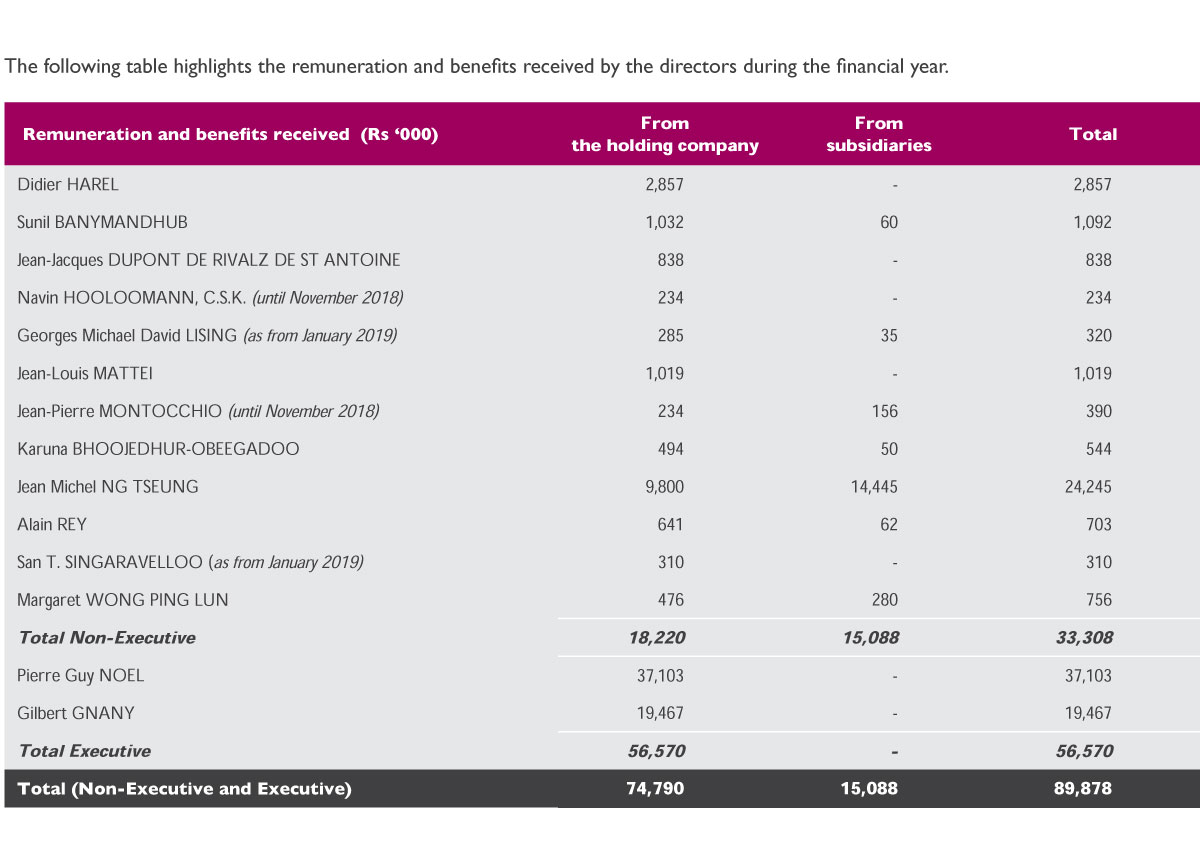
Directors’ interests and dealings in securities
With regard to directors’ dealings in the Group’s securities, the directors confirm that they have followed the absolute prohibition principles and notification requirements of the model code for securities transactions by directors as detailed in Appendix 6 of the Stock Exchange of Mauritius Listing Rules.
The Company Secretary maintains a Register of Interests of directors, which is available for consultation to shareholders upon written request to the Company Secretary. Upon their appointment, all new directors are required to notify in writing to the Company Secretary their holdings as well as the holdings of their closely related parties in the Group’s securities.
The following tables give the interests of the directors in the Group’s listed securities as at 30 June 2019 as well as related transactions effected by the directors during the financial year. None of the directors had any interest in the securities of the subsidiaries of MCB Group Ltd other than in the equity of Fincorp Investment Ltd.
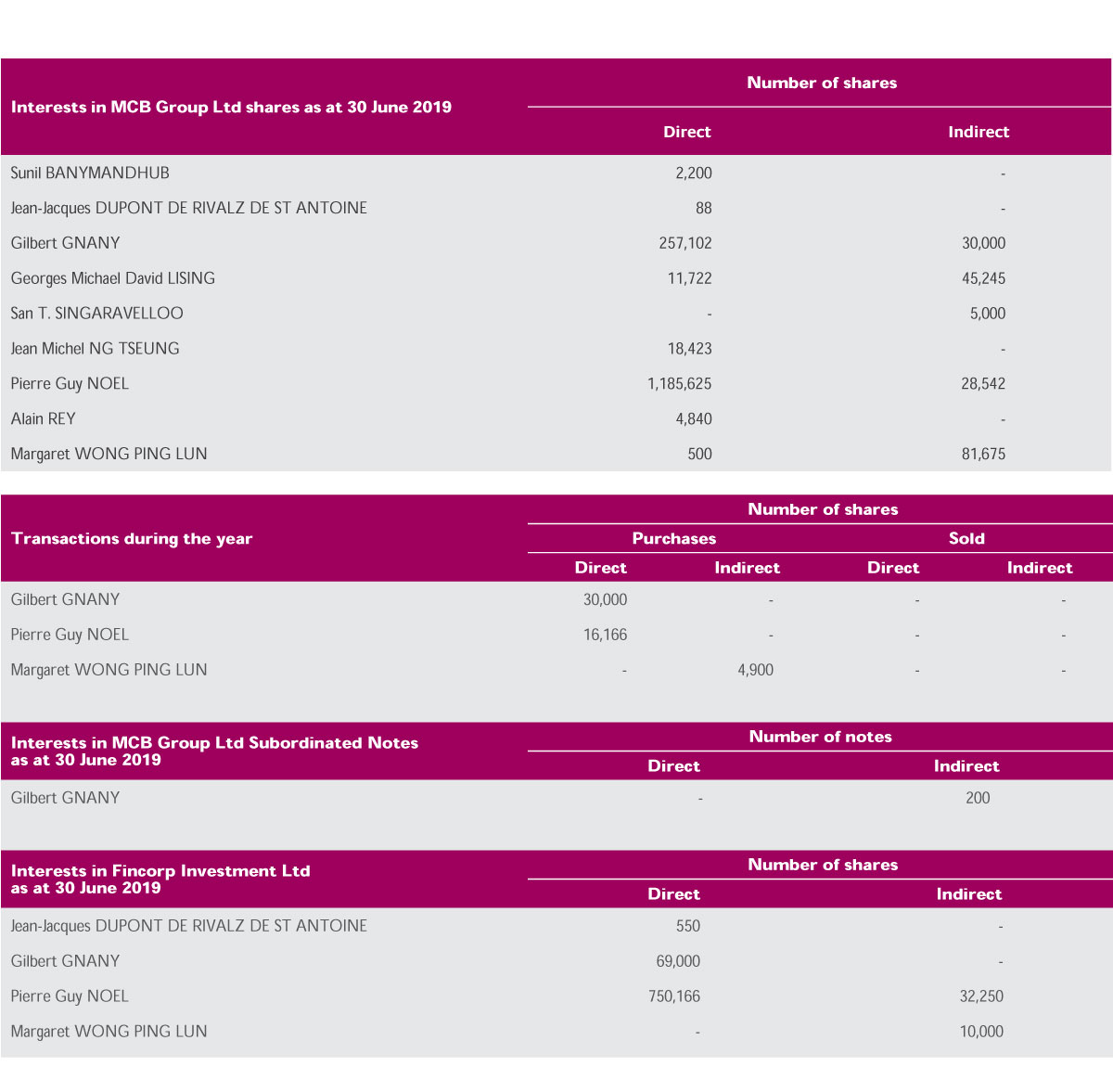
Directors’ service contracts
Related party transactions
The Board is ultimately responsible for establishing and implementing appropriate policies on conflicts of interests and related party transactions and for administering the process for handling the transactions within the Group. Assisted by the Remuneration, Corporate Governance and Ethics Committee, the Board exercises this responsibility, through:
- monitoring and reporting by Senior Management within the Company and its subsidiaries in respect of related party transactions;
- regular review of related party exposures, including those pertaining to Senior Management at the level of the Company and its subsidiaries; and
- formal review and ratification of the Conflicts of Interest and Related Party Transactions Policy as applicable.
Related party transactions of the Group were conducted in line with relevant internal policies and guidelines. For related party transactions, please refer to Note 38 of the Financial Statements.
Board Committees
The Board has delegated authority to various Board Committees to provide specialist guidance and make recommendations, through established reporting mechanisms, on areas and matters delegated to them. Each committee has its own charter, as approved by the Board and reviewed as required, which sets out, inter alia, its roles, responsibilities, composition and meetings requirement. The mandate, composition and focus areas covered during the financial year of the five Committees namely Risk Monitoring Committee, Audit Committee, Remuneration, Corporate Governance and Ethics Committee, Strategy Committee and the Supervisory and Monitoring Committee, are set out hereafter.
Risk Monitoring Commitee (RMC)
The RMC assists the Board in setting up risk mitigation strategies and in assessing and monitoring the risk management process of MCB Group Ltd and all its subsidiaries. It also advises the Board on risk issues and monitors the risk of the different portfolios against the set risk appetite of the subsidiaries.
As per its Charter, the RMC shall consist of at least three members, including the Chief Executive, with a majority of non-executive directors. The Chairperson of the Committee shall be a non-executive director and shall not be the Chairperson of the Board. The RMC meets at least quarterly and on an ad hoc basis when required.
Key facts
6
3-4
4
96%
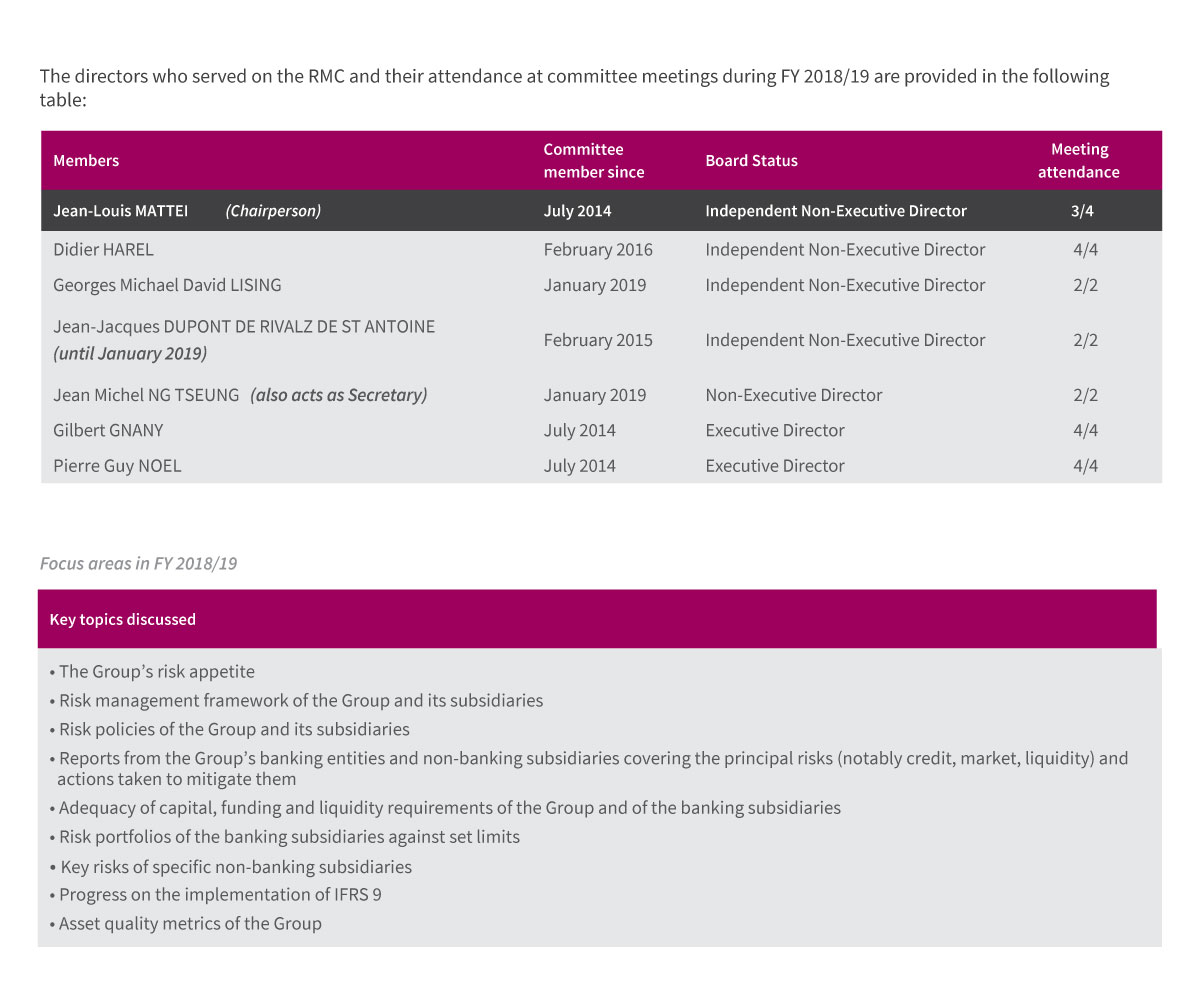
Audit Committee (AC)
The AC assists the Board in overseeing MCB Group Ltd and its subsidiaries in matters relating to the safeguarding of assets, the monitoring of internal control processes and the preparation of accurate financial reporting and statements in compliance with all applicable legal requirements and accounting standards.
Composition and meetings
As per its Charter, the AC shall consist of a minimum of three non-executive members, with a majority of independent directors from whom the Chairperson shall be nominated. The Chairperson of the Board and the Chief Executive shall not be a member of the AC. The Committee meets at least four times a year corresponding to the Company’s quarterly reporting cycle and on an ad hoc basis when required. Moreover, the Committee also holds consultations with the Chairpersons of Audit Committees of subsidiaries as deemed appropriate.
Key facts
3
3-4
8
84%
Remuneration, Corporate Governance and Ethics Committee (RCGEC)
The RCGEC assists the Board with respect to all remuneration aspects, corporate governance matters and nomination of directors and senior executives of MCB Group Ltd. Moreover, it oversees succession planning by regularly reviewing the related plan for Group senior executives and continuously updating a pipeline of directors’ profiles, for discussion at Board meeting.
Composition and meetings
As per its Charter, the RCGEC shall consist of at least three members, the majority of whom shall be independent non-executive directors. The Chairperson shall be a non-executive director and shall normally be the Chairperson of the Board. The Chief Executive may be a member of the Committee. The Committee meets at least twice a year and on an ad hoc basis when required.
Key facts
4
3-4
5
97%
The directors who served on the RCGEC and their attendance at committee meetings during FY 2018/19 are provided in the following table:
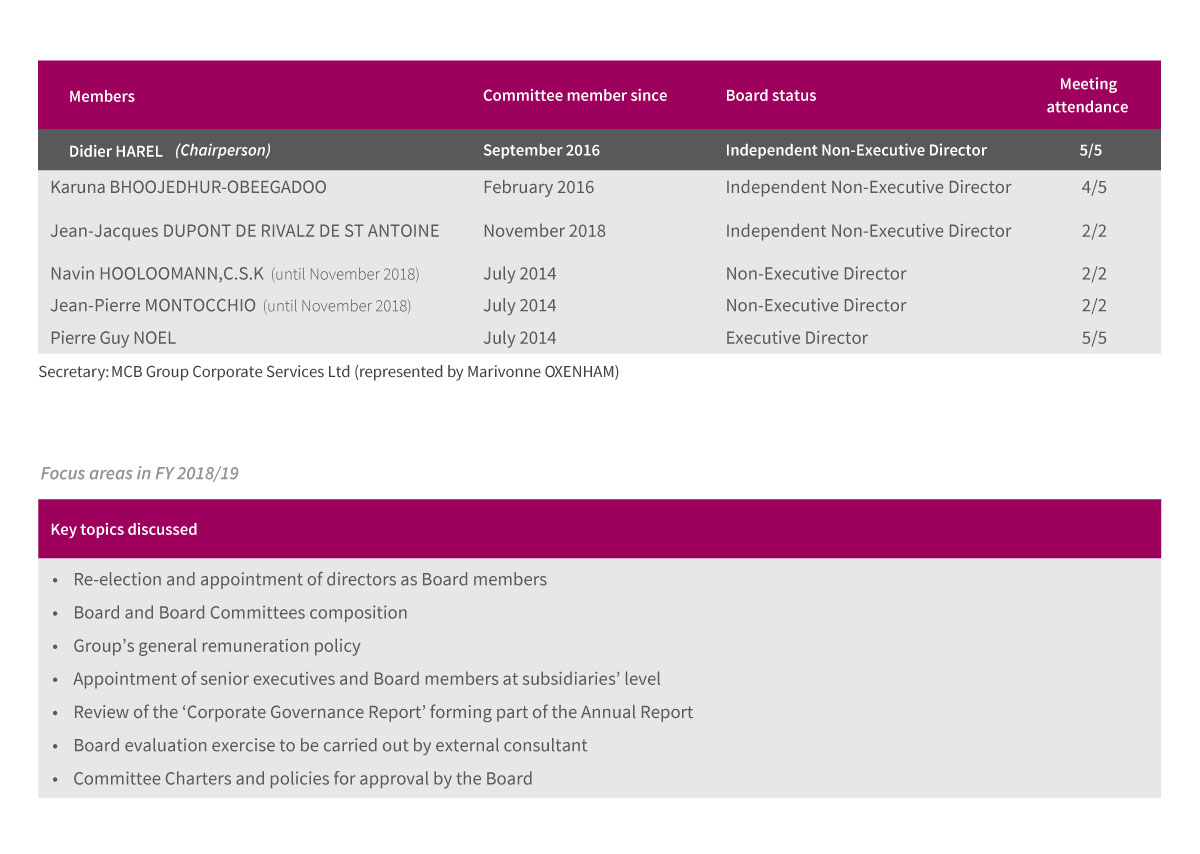
Strategy Committee (SC)
The SC assists the Board in overseeing the business strategy of MCB Group Ltd and its subsidiaries and measures the latter’s performance against set objectives whilst ensuring that capital allocation is appropriate. In addition, it helps the Board in assessing major financial and investment plans and other material issues that affect the development of the Group.
Composition and meetings
As per its Charter, the SC shall consist of at least five members with a majority of nonexecutive directors. The Chief Executive shall also be a member of the Committee. The Chairperson of the Committee shall be a non-executive director and shall normally be the Chairperson of the Board. The Committee meets at least four times in a year and on an ad hoc basis when required. The Chairperson of MCB Ltd and Chief Executives of entities of the Group may be invited to attend SC’s meetings as and when required.
Key facts
6
2-3
5
97%
*SC was set up in November 2016
Supervisory and Monitoring Committee (SMC)
The SMC assists the Board in overseeing the overall management of MCB Group Ltd and its subsidiaries as well as in providing direction and guidance on major policy matters. It also monitors and measures the Group’s performance against set objectives, in line with the strategic orientations.
Composition and meetings
As per its Charter, the SMC shall consist of a minimum of three members, including the Chairperson and the Chief Executive. Chief Executives of the subsidiaries of MCB Group Ltd may be invited to attend SMC’s meetings as required. The SMC shall meet regularly and on an ad hoc basis when required.
Key facts
3
2
10
93%
* SMC was set up in july 2017
Board effectiveness
Nomination process
The Board has a formal and transparent process in place for the nomination and appointment of directors. It is supported in fulfilling this duty by the Remuneration, Corporate Governance and Ethics Committee (RCGEC), which is responsible for overseeing board directorship’s renewal and succession planning. The RCGEC reviews the size, structure and composition of the Board on an annual basis or whenever appointments are considered. In so doing, it seeks to promote a diverse Board membership in terms of competencies, knowledge and experience. The RCGEC is also responsible for identifying candidates, carrying out interviews and recommending potential directors to the Board for its approval. The selection criteria used to assess prospective candidates relate, amongst others, to their specific skills, expertise, knowledge and experience. In addition, consideration is given to gender diversity, independence as well as the time commitment of directors in the discharge of their responsibilities. The nomination and appointment process of directors for the Group is highlighted in the diagram below.
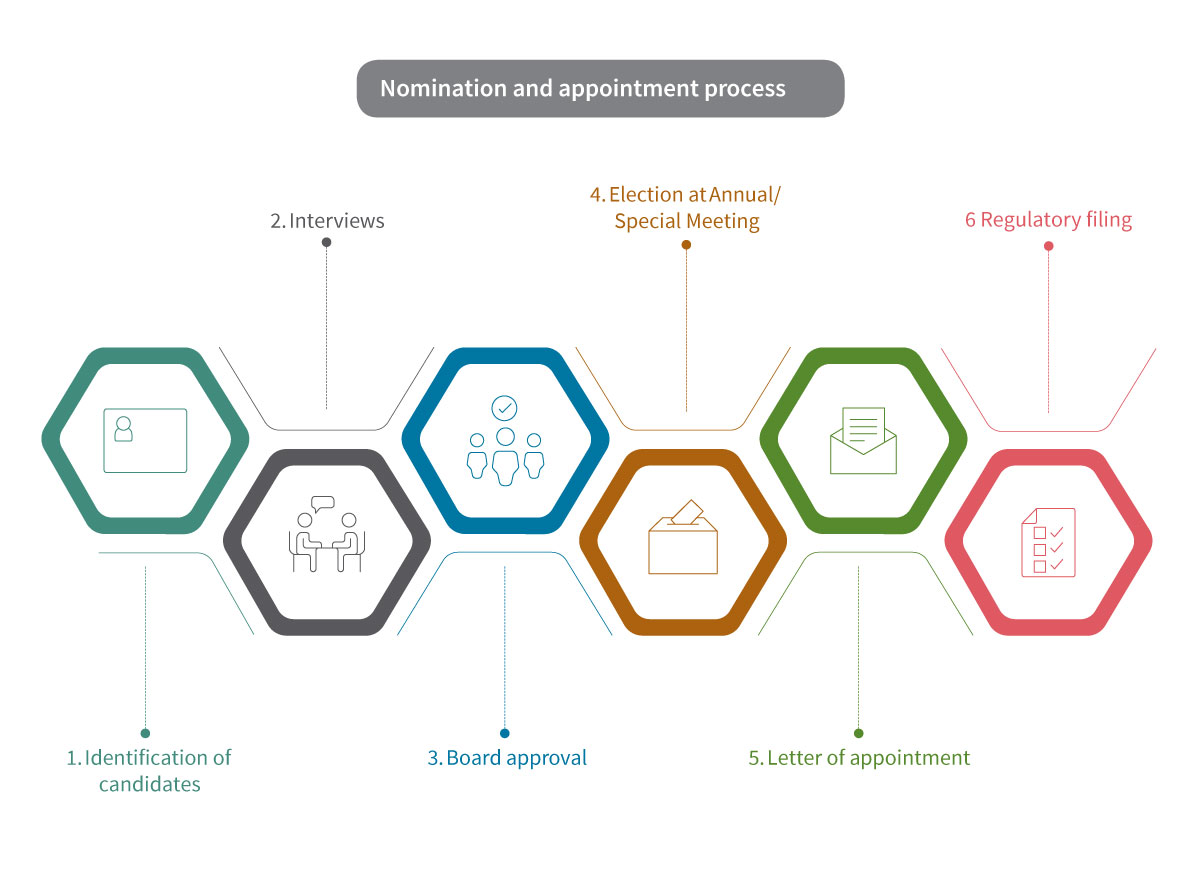
Whilst seeking to retain a core set of directors with long-standing knowledge, the Board recognises the importance of rotation of Board members to ensure that there is a good balance between continuity and fresh perspectives on the Board. It is worth highlighting that at each Annual Meeting, one third of Board members, notably those who have been longest in office, are required to retire, while being eligible to stand for re-election.
Board induction and training
On appointment to the Board, all new directors attend and participate in a comprehensive induction programme. The latter seeks, inter alia, to make them aware of their legal duties and help them to develop a quick understanding of the Group’s business operations as well as associated opportunities and challenges. The objective is to enable them to promptly and effectively contribute to strategic discussions and oversight of the Group. Furthermore, mindful of the importance of continuous learning, the Board has an ongoing training and development programme for directors, which is reviewed periodically to cater for their needs and requirements amidst an evolving context, with a training log being maintained for each director. During the last financial year, directors participated in a forum to learn more about the role and duties of a board of a banking group in a rapidly changing regulatory landscape. They also attended a workshop on Anti-Money Laundering and Combating the Financing of Terrorism. Moreover, interactive presentation sessions were organised with subject matter experts on specific business segments and with consultants working on the transformation projects. It is also worth noting that directors had the opportunity to make a local site visit to the MCB Digital Factory in August 2018 for them to gain on-the-ground knowledge of progress made with respect to the Digital Transformation Programme and to interact directly with the team involved on the project. An outline of the induction and training programme is set out in the diagram hereafter.
Induction/training programme
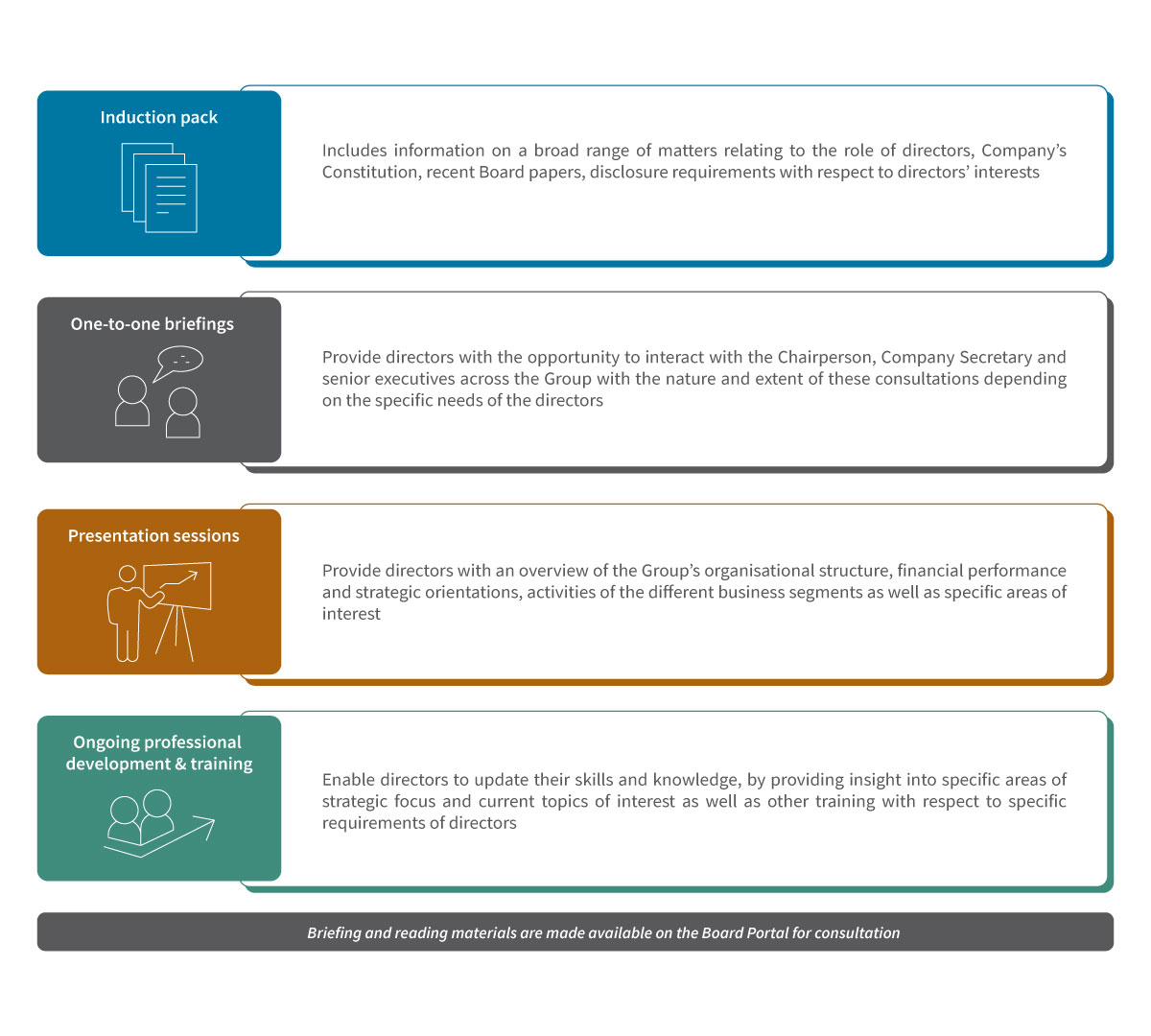
Board/Director’s performance
The Board, with the help of the RCGEC, regularly assesses its performance and effectiveness, that of its committees and individual members in order to identify areas of improvement and to act upon them accordingly. In August 2019, an evaluation exercise was conducted by an external independent consultant, Ernst and Young Ltd, on various governance aspects based on the principles of the National Code of Corporate Governance for Mauritius (2016). This assessment involved a review of governance related documents as well as gathering the views of directors on a range of topics related to the governance structure of the board and its committees, risk and control, appointment and development of directors, audit, reporting, stakeholder relations and director performance and remuneration, amongst others. The performance of the Board was scored using a pre-determined scale measuring the maturity of the Group on the chosen topics. The outcome of the assessment indicates that governance practices in place generally exceed the minimum performance and compliance requirements, and that key documents required to formalise the governance arrangements are in place. Whilst the report contained a few recommendations for enhancing performance further, it did not identify any material concern.
An outline of the evaluation process methodology used is provided in the diagram hereafter.
Risk governance
Risk management and internal control
The Board has the ultimate responsibility to maintain robust risk management and internal control systems, which it regularly reviews to cater for new emerging risks and threats emanating from the operating context. In this respect, the Board, supported by the Risk Monitoring Committee, ensures that the necessary structures, processes and methods for identification, evaluation and monitoring of the principal risks faced by the Group are integrated into the latter’s overall risk governance framework. The Board has received assurance, through the regular reporting by the Chairpersons of relevant Committees, on the adequacy of the risk management arrangements during the year under review. The Group is in the process of implementing some few changes to the risk management framework based on the recommendations from an external consultant.
The Board ensures that the internal control framework in place results in an acceptable level of risk exposure whilst guaranteeing compliance with internal established policies and procedures and relevant laws and regulations. The Board is assisted in its responsibility by the Audit Committee, which oversees the effectiveness of the Group’s internal control systems. The Internal Audit as well as the Permanent Control and Compliance functions regularly report to the Audit Committee, which also receives feedback from Audit Committees of subsidiaries.
In addition, the Committee receives reports from the Company’s external auditor and has a discussion with the latter without Management being present to ensure that there are no unresolved material issues of concern. Based on the work performed by internal and external auditors, reviews by Management and regular reporting from the Chairperson of the Audit Committee, the Board is of opinion that the internal control systems are adequate and effective.
Information governance
External auditors
Non-audit services
Auditors’ fees and fees for other services
Directors of MCB Group Ltd subsidiaries
- Pierre Guy NOEL (Chairperson)
- Jean-François DESVAUX DE MARIGNY
- Jean Michel NG TSEUNG (Chief Executive)
- Jean-François DESVAUX DE MARIGNY (Chairperson as from December 2018)
- Jean-Philippe COULIER (until December 2018)
- Priscilla BALGOBIN-BHOYRUL (until December 2018)
- Jonathan CRICHTON
- Raoul GUFFLET (Deputy Chief Executive)
- Uday Kumar GUJADHUR
- Philippe LEDESMA
- Alain LAW MIN (Chief Executive)
- Jean Michel NG TSEUNG
- Simon Pierre REY
- Jean-François DESVAUX DE MARIGNY (Chairperson)
- Gilbert GNANY (as from August 2018)
- Raoul GUFFLET
- Jean Philippe LEBON (Managing Director) (until July 2019)
- Jean Michel NG TSEUNG
- Pierre Guy NOEL
- Rony RADAYLALL (Deputy Managing Director) (Acting Managing Director since August 2019)
- Patrick RAZAFINDRAFITO
- Pierre Guy NOEL (Chairperson)
- Jean-François DESVAUX DE MARIGNY
- Gilbert GNANY
- Raoul GUFFLET
- Désiré LEO (Managing Director)
- Laila MANIK
- Jean Michel NG TSEUNG
- Gilbert GNANY (Chairperson)
- Rony LAM YAN FOON
- Akesh UMANEE
- Gilbert GNANY (Chairperson)
- Rony LAM YAN FOON
- Asante TWAGIRA
- Gilbert GNANY (Chairperson)
- Rony LAM YAN FOON
- Marivonne OXENHAM
- Vimal ORI
- Gilbert GNANY (Chairperson)
- Rony LAM YAN FOON
- Jeremy PAULSON-ELLIS
- Shivraj RANGASAMI (Managing Director)
- Gilbert GNANY (Chairperson)
- Couldip BASANTA LALA (as from November 2018)
- JRony LAM YAN FOON
- Joël LAMBERT (until April 2019)
- Bernard YEN
- Gilbert GNANY (Chairperson)
- Couldip BASANTA LALA (as from November 2018)
- Ameenah IBRAHIM (Managing Director)
- Rony LAM YAN FOON
- Michaël NAAMEH
- Jeremy PAULSON-ELLIS
- Gilles TRANCART (as from November 2018)
- Gilbert GNANY (Chairperson)
- Rony LAM YAN FOON
- Joël LAMBERT (until April 2019)
- Margaret WONG PING LUN (Chairperson)
- Jean-Philippe COULIER (as from February 2019)
- Koomaren CUNNOOSAMY
- Jean-Mée ERNEST (Managing Director)
- Michael LISING (as from February 2019)
- Pierre Guy NOEL
- Bernard D’HOTMAN DE VILLIERS (Chairperson)
- Mulk Raj GUNGAH (Managing Director)
- Martine Stephanie IP MIN WAN
- Alain LAW MIN
- François MONTOCCHIO
- Jean Michel NG TSEUNG (until December 2018)
- Anju UMROWSING-RAMTOHUL (as from July 2018)
- Pierre Guy NOEL (Chairperson)
- Paul CORSON
- Jean-Philippe COULIER (as from March 2019)
- Gilbert GNANY
- Aurélie LECLEZIO (Chief Executive Officer)
- Alain REY
- Jean-Pierre MONTOCCHIO (Chairperson)
- Sunil BANYMANDHUB
- Herbert COUACAUD, C.M.G. (until December 2018)
- Jean-Philippe COULIER (as from December 2018)
- Bashirali Abdulla CURRIMJEE, G.O.S.K. (until December 2018)
- Michel DOGER DE SPEVILLE, C.B.E. (until December 2018)
- Marivonne OXENHAM
- Margaret WONG PING LUN (as from December 2018)
- Margaret WONG PING LUN (Chairperson)
- Gilbert GNANY
- Robert IP MIN WAN
- Pierre Guy NOEL
- Jean Marc ULCOQ
- Didier HAREL (Chairperson)
- Jean-Philippe COULIER (until December 2018)
- Jean-François DESVAUX DE MARIGNY (as from December 2018)
- Gilbert GNANY
- Alain LAW MIN
- Madeleine de MARASSE ENOUF
- Pierre Guy NOEL
1 Incorporated in Seychelles
2 A subsidiary of MCB Capital Markets Ltd
3 A subsidiary of Fincorp Investment Ltd
4 A subsidiary of MCB Real Assets Ltd as from October 2017
- Pierre Guy NOEL (Chairperson)
- Regis BISTOQUET (Deputy Managing Director)
- Jean-François DESVAUX DE MARIGNY
- Gilbert GNANY
- Raoul GUFFLET
- Bernard JACKSON (Managing Director)
- Jean MAMET (until March 2019)
- Jean Michel NG TSEUNG
- Jean-François DESVAUX DE MARIGNY (Chairperson)
- Regis BISTOQUET
- Gilbert GNANY
- Bernard JACKSON
- Jean Michel NG TSEUNG (as from April 2018)
- Pierre Guy NOEL (Chairperson)
- Regis BISTOQUET
- Jean-François DESVAUX DE MARIGNY
- Gilbert GNANY
- Raoul GUFFLET
- Bernard JACKSON
- Jean MAMET (until March 2019)
- Jean Michel NG TSEUNG
- Pierre Guy NOEL (Chairperson)
- Couldip BASANTA LALA (as from November 2018)
- Bertrand DE CHAZAL
- Gilbert GNANY
- Rony LAM YAN FOON (Chief Executive Officer)
- Jeremy PAULSON-ELLIS
- Gilles TRANCART (as from November 2018)
- Gilbert GNANY (Chairperson)
- Rony LAM YAN FOON
- Joël LAMBERT (until April 2019)
- Vimal ORI
- Gilbert GNANY (Chairperson)
- Rony LAM YAN FOON
- Joël LAMBERT (until April 2019)
- Vimal ORI
- Gilbert GNANY (Chairperson)
- Rony LAM YAN FOON
- Anish GOORAH
- Vimal ORI
- Gilbert GNANY (Chairperson)
- Rony LAM YAN FOON
- Joël LAMBERT (until April 2019)
- Vimal ORI
- Gilbert GNANY (Chairperson)
- Rony LAM YAN FOON
- Joël LAMBERT (until April 2019)
- Shivraj RANGASAMI
- Bertrand DE CHAZAL (Chairperson)
- Karuna BHOOJEDHUR-OBEEGADOO (as from December 2018)
- Jean MAMET (until December 2018)
- Pierre Guy NOEL
- Pierre Guy NOEL (Chairperson)
- Jean-Michel FELIX
- Mohamed HORANI
- Samir KHALLOUQUI
- Angelo LETIMIER
- Khevin SEEBAH (Chief Executive Officer as from November 2018)
- Pierre Guy NOEL (Chairperson)
- Jean-Michel FELIX (Chief Executive Officer)
- Gilbert GNANY
- Angelo LETIMIER
- Pierre Guy NOEL (Chairperson)
- Marc DESMARAIS
- Jean-Michel FELIX
- Gilbert GNANY
- Thiery SAUZIER
- Pierre Guy NOEL (Chairperson)
- Gilbert GNANY
- Margaret WONG PING LUN (Chairperson)
- Pierre Guy NOEL
- Gilbert GNANY
- Pierre Guy NOEL (Chairperson)
- Gilbert GNANY
- Marivonne OXENHAM (Managing Director)
- Philippe A. FORGET (Chairperson)
- Jean-François DESVAUX DE MARIGNY
- Raoul GUFFLET
- Damien MAMET
- Pierre Guy NOEL
Directors of subsidiaries’ remuneration
Shareholder relations and communication
MCB Group Ltd Website
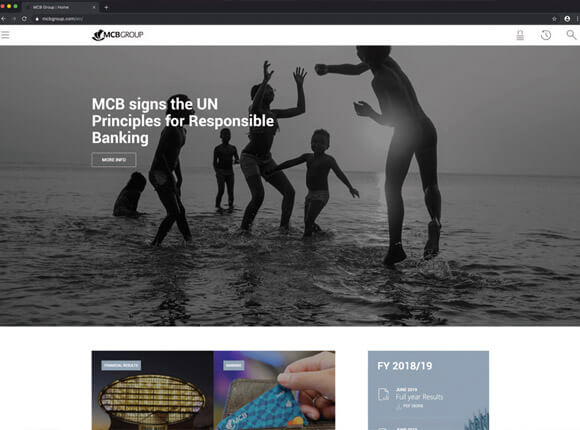
The Board considers the Annual Meeting as an important corporate event and shareholders are encouraged to attend to express their views and receive feedback from Board members directly on the Group’s financial performance and strategic directions. In case a shareholder cannot attend, votes can still be cast on all resolutions through completion of the proxy form.
Considering its diverse range of shareholders and investors with different communication and engagement needs, there are dedicated teams within the Group to attend to their requirements.
Individual shareholders
Institutional investors
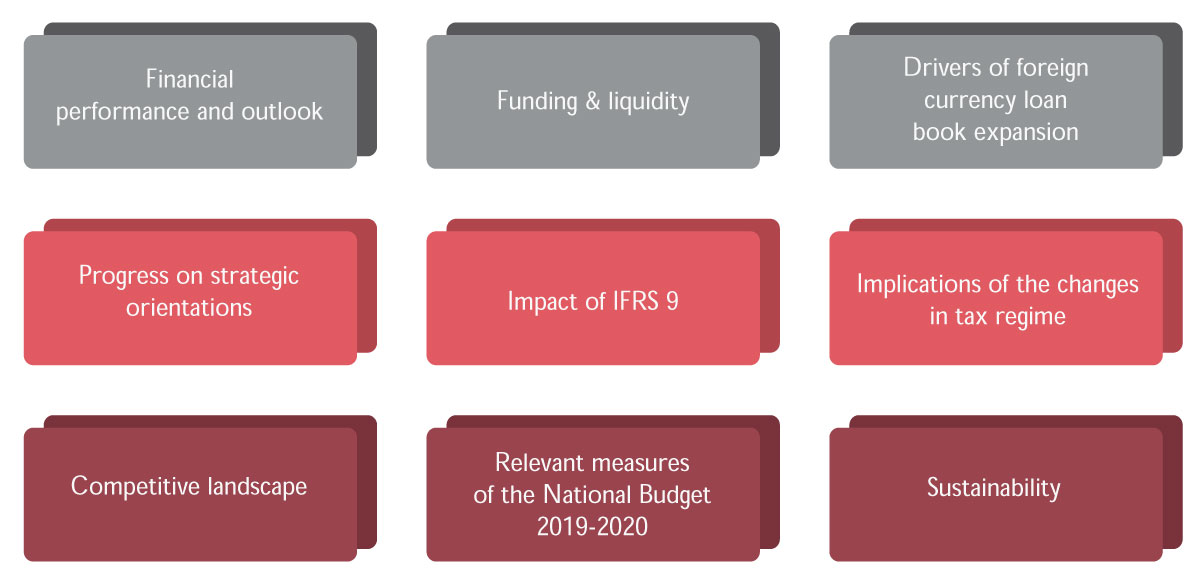
Shareholder information
Shareholding profile
The Group has a diversified ownership base of more than 20,000 shareholders, with foreign shareholding accounting for around 14% of the total. As at 30 June 2019, outstanding ordinary issued capital of MCB Group Ltd amounted to Rs 2.6 billion, comprising 238.9 million ordinary shares. The following tables set out the 10 largest shareholders and ownership of ordinary share capital by size and type as at 30 June 2019.
Key stock market indicators
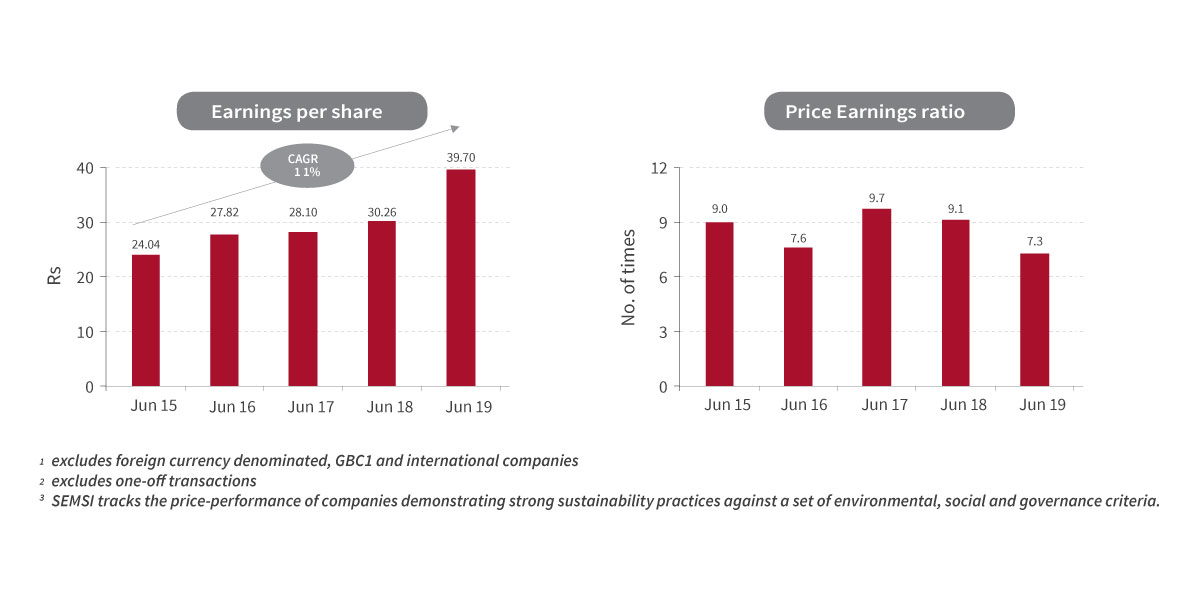
Dividend policy
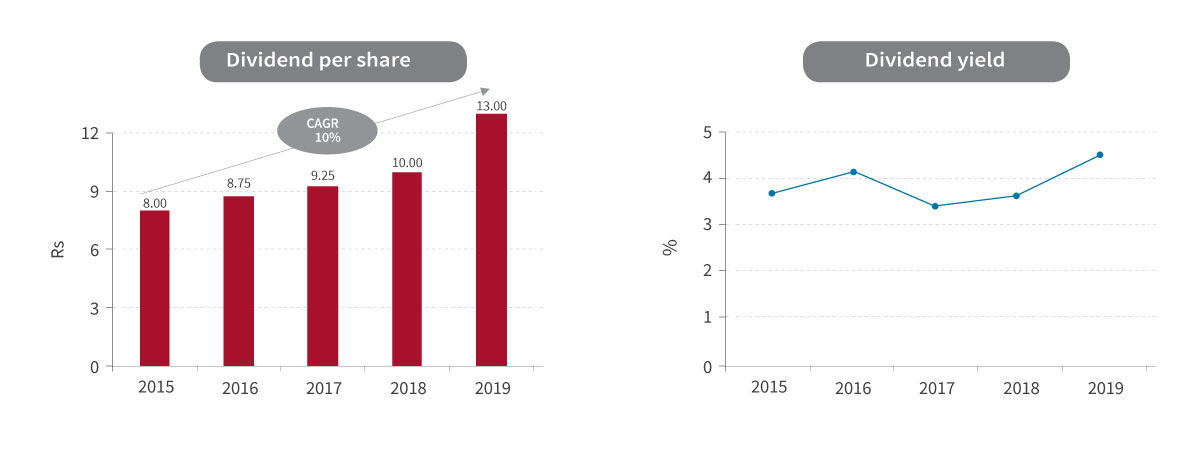
Shareholders agreements
Shareholders’ diary
Important shareholder and registrar information
Raymond Lamusse Building
Sir William Newton Street
Port Louis – Republic of Mauritius
Tel: (230) 202 5000
Email: This email address is being protected from spambots. You need JavaScript enabled to view it.
12th Floor MCB Centre
Sir William Newton Street
Port Louis – Republic of Mauritius
Tel: (230) 202 5134 / (230) 202 5558
Email: This email address is being protected from spambots. You need JavaScript enabled to view it.
OR VISIT
Statement of Directors’ responsibilities
Company law requires the directors to prepare Financial Statements for each financial year, which give a true and fair view of the state of affairs of the Group.
In preparing those Financial Statements, the directors are required to:
- ensure that adequate accounting records and an effective system of internal controls and risk management have been maintained;
- select suitable accounting policies and then apply them consistently;
- make judgements and estimates that are reasonable and prudent;
- state whether applicable accounting standards have been adhered to, subject to any material departures disclosed, explained and quantified in the Financial Statements;
- prepare the Financial Statements on the going concern basis unless it is inappropriate to presume that the Group will continue in business;
- keep proper accounting records which disclose with reasonable accuracy, at any time, the financial position of the Group while ensuring that the Financial Statements fairly present the state of affairs of the Group, as at the financial year end, and the results of its operations and cash flows for that period;
- ensure that the Financial Statements have been prepared in accordance with and comply with International Financial Reporting Standards and the Mauritian Companies Act 2001.
The external auditors are responsible for reporting on whether the Financial Statements are fairly presented. The directors are also responsible for safeguarding the assets of the Group and, hence, for taking reasonable steps for the prevention and detection of fraud and other irregularities. Other main responsibilities of the directors include the assessment of the Management’s performance relative to corporate objectives; overseeing the implementation and upholding of the Code of Corporate Governance; and ensuring timely and comprehensive communication to all stakeholders on events significant to the Group.
The directors report that:
- adequate accounting records and an effective system of internal controls and risk management have been maintained;
- the Financial Statements fairly present the state of affairs of the Group, as at the financial year end, and the results of its operations and cash flows for that period;
- appropriate accounting policies supported by reasonable and prudent judgements and estimates have been consistently used;
- International Financial Reporting Standards and the Mauritian Companies Act 2001 have been adhered to;
- the Financial Statements have been prepared on the going concern basis unless it is inappropriate to presume that the Group will continue in business.
On behalf of the Board.

M G Didier HAREL
Chairperson

Pierre Guy NOEL
Chief Executive
Statement of compliance
(Section 75 (3) of the Financial Reporting Act)
Name of Public Interest Entity (‘the PIE’): MCB Group Limited
Reporting Period: 1 July 2018 to 30 June 2019
We, the Directors of MCB Group Limited, confirm that, to the best of our knowledge, the Company has complied with all of its obligations and requirements under the National Code of Corporate Governance (2016).

M G Didier HAREL
Chairperson
27 September 2019

Pierre Guy NOEL
Chief Executive
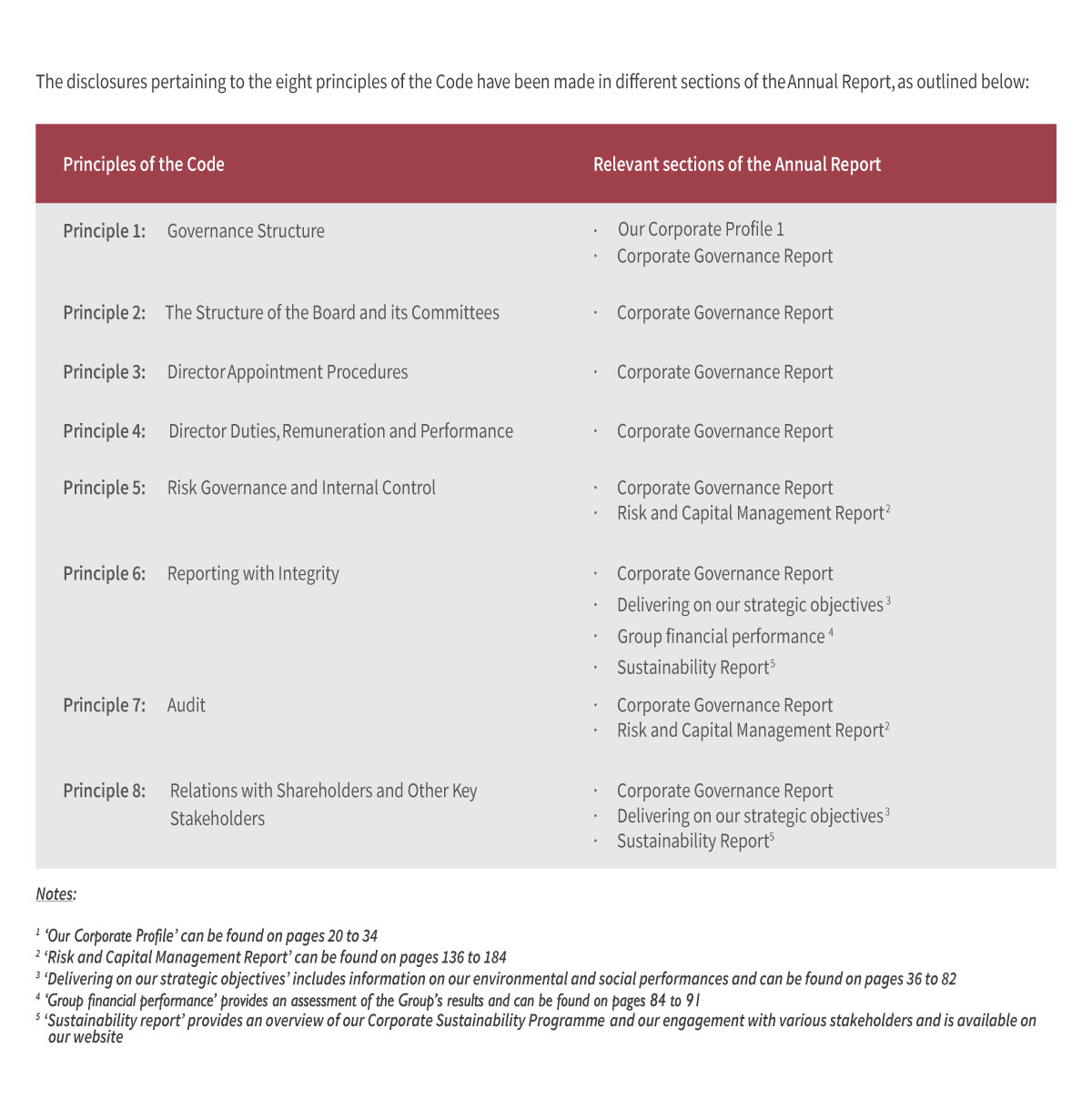
Company Secretary’s certificate
Name of Public Interest Entity (‘the PIE’): MCB Group Limited
Reporting Period: 1 July 2018 to 30 June 2019
In our capacity as Company Secretary, we hereby certify that, to the best of our knowledge and belief, the Company has filed with the Registrar of Companies all such returns as are required of the Company under the Companies Act 2001 of Mauritius in terms of section166(d).

Marivonne OXENHAM
Per MCB Group Corporate Services Ltd
Company Secretary
27 September 2019
© 2019 MCB GROUP LTD #Success Beyond Numbers


